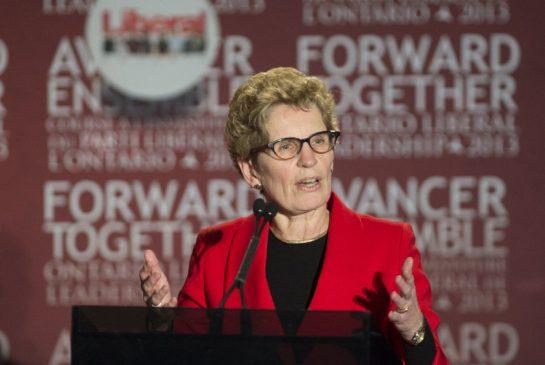
Kathleen Wynne: Focus on Ontario’s First Female Premier
Kathleen Wynne comes to her new position as Liberal leader and Ontario premier with a strong background in education and grassroots politics. She is breaking ground by being Ontario’s first female premier and openly gay. But will her political experience, her commitment to social justice, and her self-touted mediation skills translate into a repaired relationship with the education sector and a solution to the current impasse regarding Bill 115 and bargaining rights?
Community Activist
Wynne’s first foray into politics was as a parent activist. A mother of three children, she served on the parent councils of her children’s elementary and secondary schools during the mid-1980s and throughout the 1990s. In 1996, she founded the Toronto-based Metro Parent Network to fight cuts to education spending introduced by Mike Harris’s Progressive Conservative government. She also joined Citizens for Local Democracy, a grassroots organization that unsuccessfully fought the Harris government’s move to amalgamate Toronto and five surrounding municipalities.
In 1994, Wynne ran unsuccessfully in the Toronto District School Board trustee elections. She tried again in 2000 and won, assisted by her heightened profile as a community activist and the growing disenchantment with the Harris government’s education policies. As trustee, she was a vocal defender of the board’s decision to run deficit budgets as a way to draw attention to the impact of the Harris cuts.
Election to Ontario Legislature
Wynne used her trustee position to run as a Liberal candidate in the 2003 provincial election. She became MPP for Don Valley West by defeating the sitting PC MPP. In the 2003, 2007, and 2011 elections, she won consistently with more than 50 per cent of the vote, including in 2007 when she fended off a challenge from PC Leader John Tory who was looking to move to a Toronto riding. By targeting her seat, her Conservative opponents underestimated her local support and ability to mount a spirited and strategic campaign. The Liberal party establishment and her main leadership opponent, Sandra Pupatello, may have been guilty of underestimating these strengths as well.
Upon her election to the Legislature, Wynne’s education background led to her appointment as parliamentary assistant to the Minister of Training, Colleges and Universities. In October 2004, she became parliamentary assistant to then Education Minister Gerard Kennedy. When Kennedy resigned to run for the federal Liberal leadership, Wynne earned her first cabinet post when she replaced him as education minister in September 2006.
Tenure as Education Minister - September 2006 – January 2010
As education minister, Wynne extended back to her roots as a parent activist and expanded funding and ministry support for parental involvement in schools. She established a Safe School Action Team that focussed on sexual harassment, homophobia, and gender-based violence in schools. While she makes the point that she is not a gay activist, she introduced legislation and inclusive schools policy to make schools safer and more supportive of students dealing with gender identity issues. She also introduced reforms to student discipline policy to reduce the number of student suspensions and expulsions and provide more support to students subject to discipline.
Wynne ended the moratorium on school closures and increased boards’ responsibility to consult with the community and consider the community value of schools before closing them. She also established task forces to study declining enrolment and school board governance. Given her history as a school trustee and one who challenged the provincial government of the day, it is noteworthy that, as education minister, Wynne reduced the authority of school boards, refined the role of school trustee, and, in a couple of instances, appointed supervisors to oversee school board finances.
ETFO welcomed the reforms Wynne made to teacher performance appraisal as well as the government’s signature policy, full-day kindergarten. The federation did not embrace the establishment of the School Information Finder, the ministry web site that facilitates comparisons of elementary schools based on EQAO test results. The low point in ETFO’s dealings with the government during Wynne’s time as minister was the arbitrary conclusion of the 2008 provincial framework negotiations for local bargaining that resulted in a 2% salary penalty for ETFO members.
Challenges as the New Premier
Among Wynne’s challenges in taking on the mantle of Ontario premier is rebuilding relations with education sector unions and restoring morale in public schools. During her leadership campaign and since her convention victory, she has made it clear she won’t look back and undo Bill 115. Rather, she’s focussing on establishing a better bargaining process for the future. At the same time, she has emphasized the importance of ensuring students have access to extracurricular activities. As premier, Wynne has indicated she wants to broker reconciliation with education workers to achieve that goal. ETFO members are anxiously waiting to see what she puts on the table.
Stay tuned for developments on Wynne’s approach to education sector bargaining.
Vivian McCaffrey is an executive staff member at ETFO.